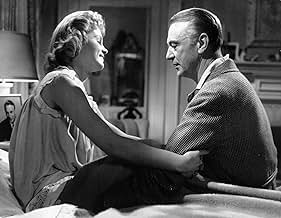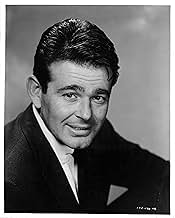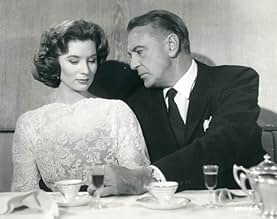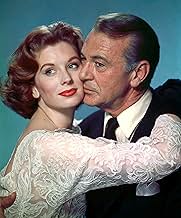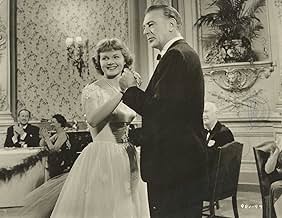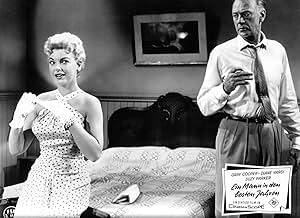Aggiungi una trama nella tua linguaAfter her father's funeral, Ann Chapin thinks back over the last five years of his life, years of apparent political and personal failure dominated by a selfish and dissatisfied wife, eased ... Leggi tuttoAfter her father's funeral, Ann Chapin thinks back over the last five years of his life, years of apparent political and personal failure dominated by a selfish and dissatisfied wife, eased only by alcohol. But it starts to emerge that he had in fact one brief and unsuspected per... Leggi tuttoAfter her father's funeral, Ann Chapin thinks back over the last five years of his life, years of apparent political and personal failure dominated by a selfish and dissatisfied wife, eased only by alcohol. But it starts to emerge that he had in fact one brief and unsuspected period of happiness and love.
- Regia
- Sceneggiatura
- Star
- Premi
- 1 vittoria e 1 candidatura in totale
- Farmer
- (non citato nei titoli originali)
- …
- Dinner Guest
- (non citato nei titoli originali)
- Dinner Guest
- (non citato nei titoli originali)
- Hope
- (non citato nei titoli originali)
- Nurse
- (non citato nei titoli originali)
- Nightclub Patron
- (non citato nei titoli originali)
- Bill
- (non citato nei titoli originali)
Recensioni in evidenza
Here, in a film based on a novel by John O'Hara, he plays Joseph Chapin, a lawyer with a son, Joby (Ray Stricklyn), a daughter,Ann (Diane Varsi) and an absolute shrew as a wife, Edith (Geraldine Fitzgerald). He's a gentle man, who has probably kept peace in his life by giving in to his wife.
The film begins with Joe's funeral, with his daughter Ann looking back on the last five years. Her own life has been affected by falling in love with a talented trumpet player (Stuart Whitman) and her ensuing unhappiness, and her brother wanted to study music at Juilliard but is pressured to attend law school. The war intervenes, and at the beginning of the film, he has returned for the funeral.
Edith has political ambitions and pushes Joe into throwing his hat in the ring; he soon finds it's too dirty a game for him and withdraws.
Joe, disillusioned, his beloved daughter having left home, he goes to New York to visit her and meets her gorgeous roommate (Suzy Parker). The two fall in love, despite their age difference.
I have to say, I felt the film was a little on the dull side - the pace was slow, and the acting, despite some of the comments here, I found rather dull. The thing about Gary Cooper is that he underplays and is very subtle - now, there's underplaying and there's just not acting. I have to say I didn't feel Diane Varsi did much acting here. Geraldine Fitzgerald was terrific, as was Ray Stricklyn, who went on to Broadway success and a huge career in publicity with the John Springer organization, handling people like Elizabeth Taylor and Bette Davis. Suzy Parker was always a total vision, but never much of an actress.
The most effective scenes were at the end of the movie, very beautiful and well worth waiting for. Cooper really shone throughout, but especially in the last section. A wonderful presence, and, like many stars of that era, we lost him too soon. It's sad to realize that they're all gone, including Varsi, who died at age 54.
Worth seeing for some of the performances. A little sharper direction would have brought it up a level.
An aging Gary Cooper , towards the end of the career, is deeply moving as a man whose ambitions are relatively modest (he only wants to be a lieutenant governor) but whose life will be ruined by a selfish wife ; his scene with Suzy Parker,when he speaks of the children they'll never have (because of his age) ,goes straight to the heart ; note that in his scene with Stuart Whitman (then an up-and-coming actor who considered Cooper a model ),he only intervenes towards the end ,as though he reluctantly approves of his collaborators' advice (and blackmail)
Matching him every step of the way is Geraldine Fitzgerald' s cold self-centered socialite who does not care about her children 's happiness. A woman who never loved anyone but herself.
Diane Varsi is convincing as the sacrificed daughter ,but her affair with Buongiorno is a little botched ; Ray Stricklyn who,unlike Whitman , never became a big star, shines in his last scene when he takes a rebel stand against these hypocrit "friends " ( the first scenes ,notably with the journalists ,were revealing )
The political ambitions of leading character Joseph Chapin in the novel have been reduced here and Dunne has opted to develop a brief fling between middle-aged Chapin and Kate Drummond, a woman half his age, into a full blown romance. It must be said that the beautifully understated and sensitive playing of Gary Gooper and lovely Suzy Parker has resulted in one of the most moving and heartbreaking Spring/Autumn affairs ever committed to celluloid.
By all accounts Mr. Cooper jumped at the chance to play the part originally turned down by Spencer Tracy and would no doubt have identified with his character as he had earlier called off his relationship with Patricia Neal and returned to his wife who was hopefully more forgiving that his spouse in this, played by the superlative Geraldine Fitzgerald. There were also distinct echoes of Diane Varsi's own life in her role of Chapin's daughter, having come from a broken home and been twice divorced by the age of twenty one. This talented but fragile artiste suffered a breakdown during filming and was later to quit Fox studios as she felt she was 'heading for destruction'.
Great support from John Emery, Philip Ober, the ill-fated Tom Tully and the inimitable Barbara Nicholls as a party girl. There is a splendid score by Leigh Harline but the confounded Cinemascope format alas proves itself once again totally unsuited to intimacy. The phrase 'they don't make them like that anymore' is used to describe the character of Joe Chapin. It might just as easily refer to Gary Cooper.
The disillusionment, regret and sense of failure depicted here cannot fail to strike a chord with most of us and call to mind Whittier's 'Of all the sad words of tongue or pen, the saddest are these: it might have been.'
Gary Cooper and Geraldine Fitzgerald are in fine form as the middle aged man and vicious wife. With the ending of his career approaching, Cooper gave an outstanding performance as a man who was just too good for the society that he lived in. Equally impressive was Geraldine Fitzgerald, his wife Edith, with her sterling political ambitions that could easily rival Mary Todd Lincoln. Erudite, yet a tramp in her own right, Fitzgerald etched an unforgettable character in using such terms as mawkish. (Fitzgerald could have easily played Mary Todd Lincoln in the great 1940 film "Abe Lincoln in Illinois if Ruth Gordon hadn't been available.) Some could call the film dated but what an impressive date! The mores of yesterday were defined that in politics, if you had a scandal in the family, you were ruined. Not so necessarily true today. The same more could be applied to older men married to younger women. Sociologists could really have a ball with this terrific film.
When he sees the dirt that politics brings, he begins an affair with his daughter's room mate. Diane Varsi, who was so good in "Peyton Place," shines as the daughter. Suzy Parker is her friend who has an affair with Cooper.
Fitzgerald pulls out all the stops in her vicious tirades. She is soon slapped down by her son who denounces her publicly for what she has done to her husband.
A wonderful film detailing moral values and their decline in a society where they are most needed. Highly recommended film to all viewers.
Romantic and consuming; from the pen of Philip Dunne. This is an over looked drama shot in black and white. Daughter Ann is played by Diane Varsi and her roommate Kate is played by the lovely Suzy Parker. Also in the cast are Stuart Whitman and Ray Sticklyn.
Lo sapevi?
- QuizSpencer Tracy was originally cast in the lead role, but withdrew due to ill health and concerns over the ability of co-star Suzy Parker. Tracy told reporters in November 1957 he had withdrawn from this film to star in L'ultimo urrà (1958).
- BlooperIn the bulk of the story, which begins and ends in 1945 and flashes back to 1940, all of the female clothing and hairstyles are strictly in the 1958 mode.
- Citazioni
Stella: You're hurtin' my arm.
Joseph B. 'Joe' Chapin: I frequently hurt people without meaning to. It's my specialty.
- ConnessioniFeatured in Innocenza infranta (1997)
- Colonne sonoreOn the Atchison, Topeka and the Santa Fe
(uncredited)
Music by Harry Warren
Played on the phonograph in Joby's room
I più visti
- How long is Ten North Frederick?Powered by Alexa
- Is this the only CinemaScope feature filmed in black and white?
Dettagli
- Tempo di esecuzione1 ora 42 minuti
- Colore
- Mix di suoni
- Proporzioni
- 2.35 : 1
Contribuisci a questa pagina


